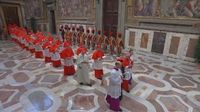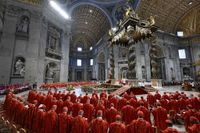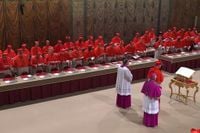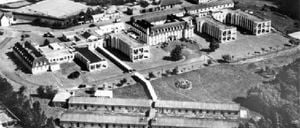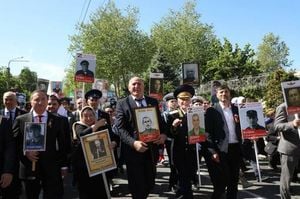The conclave to choose the successor of Pope Francis officially began at approximately 16:30 local time (11:30 AM in Brasília) on May 7, 2025. A solemn procession of 133 cardinals made their way into the Sistine Chapel, the location designated for the voting process. The cardinals will remain isolated until a new pope is elected, a process that is expected to take several days.
The first vote is set to take place on Tuesday evening, concluding around 19:00 (14:00 in Brasília). The outcome of this vote will be indicated by smoke rising from the chapel's chimney: black smoke will signal that no majority was reached, while white smoke will confirm the election of a new pope. This smoke signal is anticipated to emerge by 19:00 on the same day.
Earlier in the day, the cardinals participated in a mass at St. Peter's Basilica, attended by over 5,000 people. During this service, Cardinal Giovanni Battista Re urged the assistance of the Holy Spirit to guide the cardinals in making a wise choice for the next pontiff.
As part of the traditional proceedings, the cardinals began their procession from the Capela Paulina after a lunch break and a final moment of reflection. The procession was accompanied by the chant "Veni Creator", a hymn that sets a solemn tone for the proceedings. Upon their arrival at the Sistine Chapel, the cardinals sang "Spiritus Sanctus" and took both a collective and individual oath, promising to maintain absolute secrecy regarding the papal election.
Once the doors of the Sistine Chapel were closed to outsiders, the cardinals entered a state of total isolation, committing to refrain from any contact with those not involved in the voting process. This conclave will extend over several days, with the cardinals residing in two Vatican houses. The voting will proceed until one candidate secures at least two-thirds of the votes, which amounts to 98 out of 133.
During the election process, the cardinals will use rectangular ballots inscribed with the phrase "Eligo in Summum Pontificem" ("I elect as Supreme Pontiff"). Each cardinal will write the name of their chosen candidate on the ballot in an effort to maintain secrecy, and they will then present their ballot at the altar while reciting an oath in Latin: "I put Christ the Lord as my witness, who will judge me, that I give my vote to whom I believe should be elected in the presence of God."
Should no cardinal achieve the required two-thirds majority in the first round of voting, the process will continue with additional votes. Following every two rounds of voting, the ballots and notes will be incinerated. If three days pass without a pope being elected, the voting will be suspended for a day of prayer.
The elected cardinal will be asked two questions by the dean: "Do you accept your canonical election to Supreme Pontiff?" and "What name do you wish to be called?" If the cardinal affirms the first question, he will officially become the pope and Bishop of Rome. Subsequently, each cardinal will express a gesture of respect and obedience to the newly elected pope before the announcement is made to the faithful.
Once a new pontiff is confirmed, the protodeacon will announce "Habemus papam" from the balcony of St. Peter's Basilica, after which the new pope will appear to deliver the traditional blessing "urbi et orbi" (to the city and to the world) and make his first address as pope.
As the cardinals embark on this momentous journey to elect the new leader of the Roman Catholic Church, observers worldwide remain hopeful yet skeptical about the outcome. With the complexities of the selection process and the requirement for a significant consensus, the anticipation builds as the faithful await the first smoke signal from the chapel.
